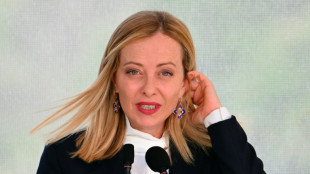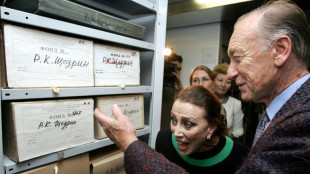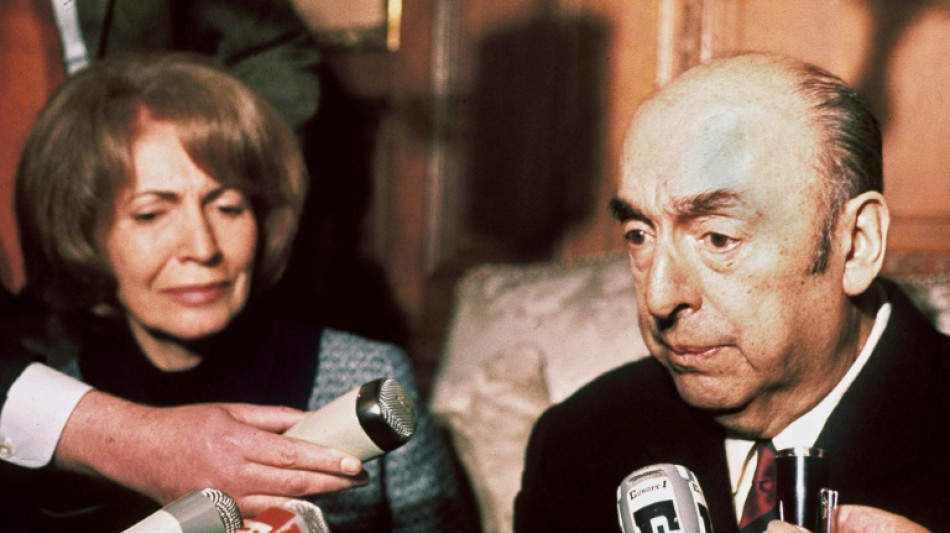
-
 Chinese rookie Wang grabs LPGA lead at storm-hit TPC Boston
Chinese rookie Wang grabs LPGA lead at storm-hit TPC Boston
-
US appeals court finds Trump's global tariffs illegal
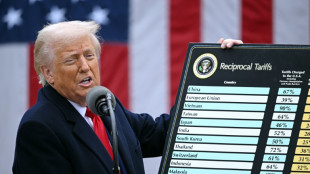
-
 Sounders out to 'prove a point' against Messi's Inter in Leagues Cup final
Sounders out to 'prove a point' against Messi's Inter in Leagues Cup final
-
'Trans' neo-Nazi shakes up gender debate in Germany

-
 Tiafoe bounced out in US Open third round
Tiafoe bounced out in US Open third round
-
Argentina police carry out raids in
Milei sister graft probe
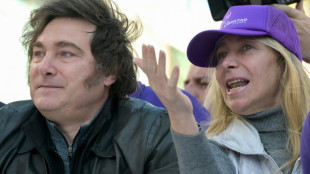
-
 Maresca won't ban Chelsea players from social media
Maresca won't ban Chelsea players from social media
-
US Spirit Airlines files for bankruptcy again

-
 Amorim expects to stay at Man Utd as pressure mounts
Amorim expects to stay at Man Utd as pressure mounts
-
Alcaraz romps into US Open fourth round, injured Shelton exits

-
 Mussolini's great grandson hails winning Serie A debut with table-toppers Cremonese
Mussolini's great grandson hails winning Serie A debut with table-toppers Cremonese
-
Shelton quits US Open with shoulder injury

-
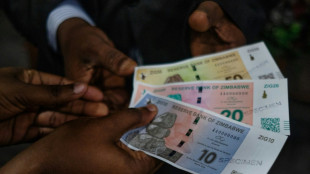 In whirlwind tour, Qatari royal commits $70bn to southern Africa
In whirlwind tour, Qatari royal commits $70bn to southern Africa
-
St Pauli upstage Hamburg in derby return

-
 Trump moves to cut more foreign aid, risking shutdown
Trump moves to cut more foreign aid, risking shutdown
-
Hearing ends without ruling on Trump attempt to oust Fed Governor Cook
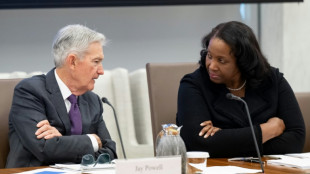
-
 Europeans tell Iran offer on table to avoid sanctions
Europeans tell Iran offer on table to avoid sanctions
-
FA Cup-holders Palace sign Spain winger Pino

-
 Alcaraz romps into US Open fourth round, Rybakina advances
Alcaraz romps into US Open fourth round, Rybakina advances
-
Alcaraz mows down Darderi to reach US Open last 16
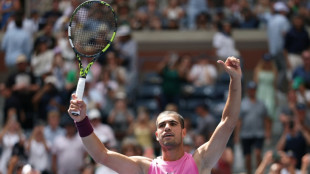
-
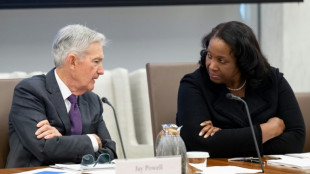 Court battle underway as Fed Governor Cook contests firing by Trump
Court battle underway as Fed Governor Cook contests firing by Trump
-
Schwarber hits historic four homers but misses rare shot at five

-
 Injury doubt Tonali picked by Gattuso for Italy's World Cup qualifiers
Injury doubt Tonali picked by Gattuso for Italy's World Cup qualifiers
-
Spurs sign Dutch midfielder Simons in boost for new boss Frank

-
 Rybakina routs Raducanu to advance at US Open
Rybakina routs Raducanu to advance at US Open
-
US banana giant Chiquita returns to Panama

-
 Martin says Rangers remain supportive despite woeful start
Martin says Rangers remain supportive despite woeful start
-
Stocks slide as US inflation clouds rates outlook
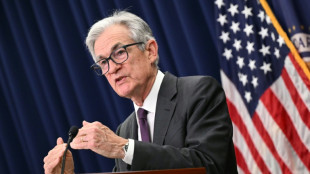
-
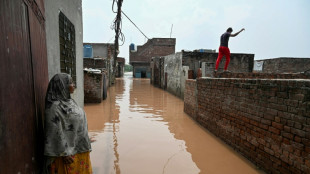 Smog then floods: Pakistani families 'can't catch a break'
Smog then floods: Pakistani families 'can't catch a break'
-
US to refuse visas to Palestinian officials at UN summit on state
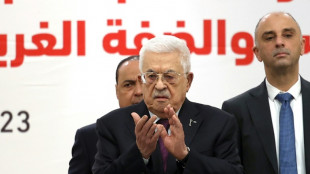
-
 Ayuso triumphs in Vuelta stage seven, Traen keeps red jersey
Ayuso triumphs in Vuelta stage seven, Traen keeps red jersey
-
Goalkeepers still posing problems for Man City boss Guardiola
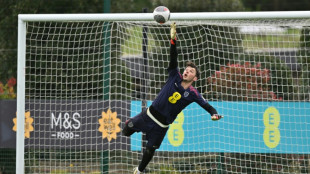
-
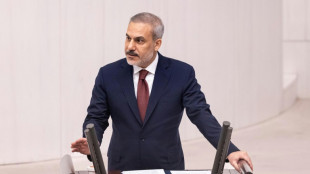 Turkey bars Israeli ships, flights from its territory
Turkey bars Israeli ships, flights from its territory
-
Forest boss Nuno plans Marinakis talks after transfer issues

-
 Putin will have 'played' Trump if he refuses to meet Zelensky: Macron
Putin will have 'played' Trump if he refuses to meet Zelensky: Macron
-
Norris sets early pace at Dutch Grand Prix practice

-
 Bargell tackles medical challenge and starts for US at Women's Rugby World Cup
Bargell tackles medical challenge and starts for US at Women's Rugby World Cup
-
Vardy in talks to sign for Serie A outfit Cremonese: source

-
 Trump withdraws Kamala Harris's Secret Service protection
Trump withdraws Kamala Harris's Secret Service protection
-
Arteta concerned by Saka injuries after latest hamstring blow

-
 Red Cross says number of missing people surging
Red Cross says number of missing people surging
-
Tuchel apologised to Bellingham over 'repulsive' blast

-
 Garnacho arrives at Chelsea as £40 m move from Man Utd moves closer
Garnacho arrives at Chelsea as £40 m move from Man Utd moves closer
-
Iran has executed at least 841 people this year: UN

-
 'Sometimes I want to quit' says troubled Man Utd boss Amorim
'Sometimes I want to quit' says troubled Man Utd boss Amorim
-
German neo-Nazi heads for women's jail after gender change

-
 Crystal Palace to face Dynamo Kyiv, Strasbourg in Conference League
Crystal Palace to face Dynamo Kyiv, Strasbourg in Conference League
-
Japan pledges $68 billion investment in India
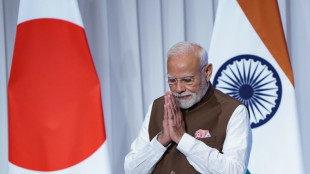
-
 Europa League draw throws up Forest rematch with Malmo
Europa League draw throws up Forest rematch with Malmo
-
Rooney reckons 'something is broken' at Amorim's Man Utd


Was Neruda poisoned? Probe members say inconclusive
Two members of a scientific panel that investigated the mysterious death of Nobel laureate Pablo Neruda told AFP that they could not determine whether or not the Chilean poet and diplomat had been poisoned.
The panel of scientific experts delivered a report into Neruda's death to Chilean judge Paola Plaza on Wednesday, with the country on tenterhooks waiting to find out its conclusions.
Researchers Hendrik and Debi Poinar, from McMaster University in Canada, told AFP that their examination of one of Neruda's molars confirmed the presence of dangerous botulism-causing bacteria, but was ultimately inconclusive as to how it entered his system.
"It's there, at the time of his death," they said of the clostridium botulinum DNA, "but we don't yet know why."
"We just know that it should not be there."
Neruda was a celebrated poet, politician, diplomat and bohemian figure, and also a prominent member of the Chilean communist party when former military dictator Augusto Pinochet took power in a 1973 coup.
He had been preparing to flee into exile in Mexico to lead the resistance against the Pinochet regime when he died in hospital just 12 days after the coup.
At that time, the government claimed the 69-year-old had died of prostate cancer.
The panel's findings have yet to be disclosed as Plaza is due to study their report.
In the meantime, rumors have been swirling that the report confirms the suspicion of Neruda's poisoning, which his nephew also claimed earlier this week.
Researchers were only able to reconstruct a third of the bacterium's genome for the study, McMaster University reported on Wednesday.
The Poinars told AFP that they would be able to recreate the rest of the genome without exhuming Neruda's body to gather another sample.
"There are enough materials to do that now with what remains in the lab," they said.
"We just need to know that the court is ok with that."
An investigation into the cause of Neruda's death first began in 2011 when Manuel Araya, who had been his driver and personal assistant, asserted that the poet was given a mysterious injection in his chest just before he died.
In 2017 a group of Chilean and international experts concluded that Neruda did not die of cancer but said they could not determine what did kill him.
Pinochet, who ruled Chile for 17 years, oversaw a regime that killed some 3,200 leftist activists and other suspected opponents.
The dictator died in 2006 at age 91 without ever being convicted for crimes committed by his regime.
Neruda is remembered especially for sensual poems about love.
S.Keller--BTB


